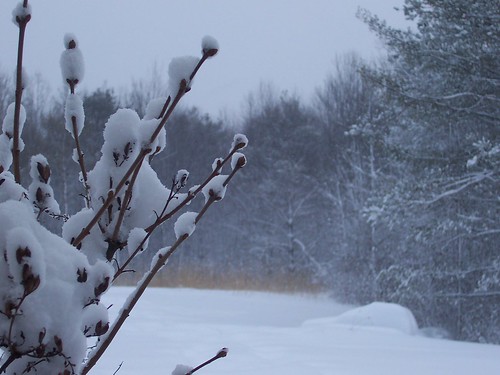It's not time for spring break yet, but I am taking mine a bit early. My suitcase is packed. I'm off to a conference, held this year in City Burned to the Ground During the Civil War. In class, I gave my students a project to work on while I was gone and told them I was heading to Warm Southern City.
Of course, they all had to chime in with interesting facts about City at the Beginning of the Alphabet. One of my landscape architects told me that the city is famous for being an urban heat island that generates a permanent low pressure system, sort of like a torture chamber for someone who gets migraines. Another student claims there is some kind of whole museum dedicated to Famous Soft Drink filled with caffeine and sugar. A biology student told me cheerfully that the newest tourist trap in the city is a huge building where intelligent mammals who have both language and sonar are trapped in tanks of water and forced to perform tricks for a human audience.
I think they are just jealous that I am going someplace warmer, leaving behind the snowbanks and icy roads and winds that blow snow into every crevice of clothing.
I miss my family when I travel and I hate luxury hotels with windows that don't open, but I like everything else about attending a conference. The sessions leave me stimulated by new ideas and perspectives. Long discussions over dinner with colleagues and friends sometimes end up stretching far into the night. I'll have a chance to meet some writers whose work I've long admired; I'll be saturated with poetry by the end of each night. Most importantly, four or five days at a conference gives me time to evaluate what I want to do next with my career and where I want to spend my energy. I will come home with lists of books that I must read, email addresses of colleagues who have become friends, and a journal full of ideas.
February 27, 2007
February 26, 2007
In the snow
Earlier this month, I wrote about how difficult I find the month of February, and one of my readers, kate5kiwis, said she was going to go to the beach and write my name in the sand. I loved that image.
When my four children were small, I would sometimes feel overwhelmed and frustrated by the end of the day, especially in the summer when I was home with them all the time. Often in the evenings, I'd leave them with my husband, needing to get away from the house to have some quiet to myself. I would go to Pretty Colour Lakes, and walk the trail around the lake, letting the smell of cedar and the green-blue of the lake soothe me. And then I would walk across the beach, stopping to write my name in the sand.
This winter, I've been taking my walks on roads instead of trails because a level surface is easier on my injured knee. High snowbanks edge the roads, and on windy days, the powdery snow blows across the pavement. This week, as we finally near the end of the long month of February, I stopped to write my name in the snow.
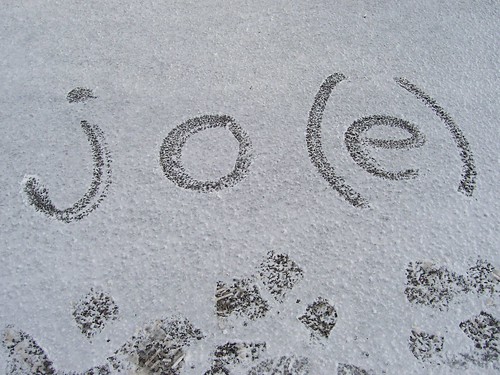
When my four children were small, I would sometimes feel overwhelmed and frustrated by the end of the day, especially in the summer when I was home with them all the time. Often in the evenings, I'd leave them with my husband, needing to get away from the house to have some quiet to myself. I would go to Pretty Colour Lakes, and walk the trail around the lake, letting the smell of cedar and the green-blue of the lake soothe me. And then I would walk across the beach, stopping to write my name in the sand.
This winter, I've been taking my walks on roads instead of trails because a level surface is easier on my injured knee. High snowbanks edge the roads, and on windy days, the powdery snow blows across the pavement. This week, as we finally near the end of the long month of February, I stopped to write my name in the snow.

February 25, 2007
Soup and dancing
We gathered early evening, every woman bringing food – three kinds of hot soup, a big salad, breads and veggie dishes and all kinds of snacks. The ten of us have been friends for years, and we know each other's dietary needs. "Don't worry – this is vegan," Makes Bread said to me as she set her crockpot on the counter. "I brought feta made from soy," Gorgeous Eyes announced. By the time everyone had arrived, the floor near the door was piled with duffle bags and sleeping bags, and the table was crowded with food and piles of CDs.
A pajama party is one of the best ways to combat the February blues.
For the first couple of hours, we milled about in the kitchen, all eating and talking, catching up on news, most of us jazzed from the stress of the week. The meals that I share with this group of friends are always amazing: Makes Bread is a dietician, Gorgeous Eyes owns a health food store, and Quilt Artist cooks intuitively, turning something simple like squash soup into a work of art. When we could eat no more, we gathered by the fire, relaxed, ready to sink into deeper conversations. Of course, not all the conversations were deep and meaningful: some were silly. This group of friends are able to go from serious to hilariously funny in about ten seconds flat. We discussed everything from the Stockholm Syndrome to pug bowling to the Saturday Night Live clip "A Dick in a Box."
Gradually, the high energy chatting gave way to a quiet contentment. Signing Woman gave Dark-haired Woman a massage. The fire had heated up the room enough for everyone to begin stripping off their heavy sweaters, snuggling into the comfy couch. When we saw signs that a few of our friends were getting sleepy, Long Beautiful Hair and I took matters into our own hands, took control of the boombox, and pushed back the furniture. It was time for dance music.
In the dim room, with candles burning on the window sills and flames from the fireplace reflecting from the window panes, we twirled and shimmied and bounced to the music. We teased Dark-haired Woman for knowing the words to one of the corniest songs; we cranked up songs that many of us haven't heard in a few decades. How good it felt to move to music, releasing all kinds of tension stored in our bodies. We agreed later, as we talked by the fire, that dance deprivation is a problem in our culture.
After midnight, we settled back onto the pillows and cushions, and the conversation grew more intimate. "I've been waiting all week to tell you this story," Long Beautiful Hair said, shaking her hair out of her eyes and we all leaned forward eagerly. We were all tired by then, but we stayed up late anyhow, luxuriating in the each other's company, eager to confide in each other. By the time we finally went to bed, the beeswax candles had burned down to the bottom of the glass containers. Stars shone above the snowbanks outside as I drifted off to sleep.
A pajama party is one of the best ways to combat the February blues.
For the first couple of hours, we milled about in the kitchen, all eating and talking, catching up on news, most of us jazzed from the stress of the week. The meals that I share with this group of friends are always amazing: Makes Bread is a dietician, Gorgeous Eyes owns a health food store, and Quilt Artist cooks intuitively, turning something simple like squash soup into a work of art. When we could eat no more, we gathered by the fire, relaxed, ready to sink into deeper conversations. Of course, not all the conversations were deep and meaningful: some were silly. This group of friends are able to go from serious to hilariously funny in about ten seconds flat. We discussed everything from the Stockholm Syndrome to pug bowling to the Saturday Night Live clip "A Dick in a Box."
Gradually, the high energy chatting gave way to a quiet contentment. Signing Woman gave Dark-haired Woman a massage. The fire had heated up the room enough for everyone to begin stripping off their heavy sweaters, snuggling into the comfy couch. When we saw signs that a few of our friends were getting sleepy, Long Beautiful Hair and I took matters into our own hands, took control of the boombox, and pushed back the furniture. It was time for dance music.
In the dim room, with candles burning on the window sills and flames from the fireplace reflecting from the window panes, we twirled and shimmied and bounced to the music. We teased Dark-haired Woman for knowing the words to one of the corniest songs; we cranked up songs that many of us haven't heard in a few decades. How good it felt to move to music, releasing all kinds of tension stored in our bodies. We agreed later, as we talked by the fire, that dance deprivation is a problem in our culture.
After midnight, we settled back onto the pillows and cushions, and the conversation grew more intimate. "I've been waiting all week to tell you this story," Long Beautiful Hair said, shaking her hair out of her eyes and we all leaned forward eagerly. We were all tired by then, but we stayed up late anyhow, luxuriating in the each other's company, eager to confide in each other. By the time we finally went to bed, the beeswax candles had burned down to the bottom of the glass containers. Stars shone above the snowbanks outside as I drifted off to sleep.
February 24, 2007
Through the woods
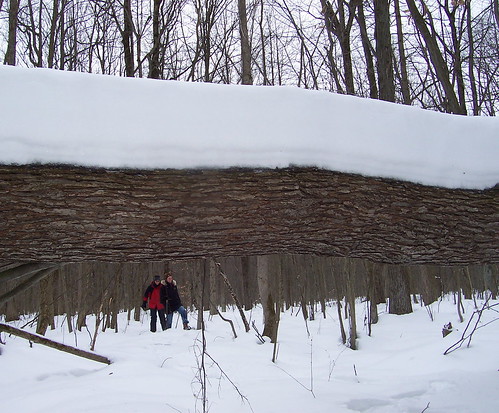
One of the most difficult things about this knee injury has been spending so much time indoors during February. We've gotten all kinds of wonderful snow lately, and I haven't been able to snowboard or ski or ice skate or snowshoe. But today, I decided my knee was well enough for the least strenuous of those activities, snowshoeing in the woods behind my house.
Two friends, Long Beautiful Hair and Gorgeous Eyes, joined me. The combination of warm sunlight followed by cold night air had created an icy surface on the deep snow, and in the back meadow, we skimmed along the surface, several feet above the frozen ground. After a morning spent inside by the fire, we gulped moist air. Metal snowshoes crunched against snow as we entered the woods in single file. I led my friends through the forest to the fallen tree where I often sit and listen to the sounds of trees creaking in the wind. Today, this log seat was so piled with icy snow that when Long Beautiful Hair sat down, she slid right off and fell backwards into the snow, laughing as she went. Soon all three of us were lying in the snow, staring up at the bare branches that held up a grey winter sky.
"Which trail do you want to take next?" I asked my friends.
Gorgeous Eyes looked at me in surprise. "Trails? Have we been following trails?"
I looked around at the woods to see them from her perspective. In the deep snow, it is true, you can't really tell where any of my trails are. Because I've been stuck inside with the knee injury these last weeks, there are no snowshoe marks, no ridges made from cross country skis. The ground is crisscrossed with trails made from deer, rabbit, and dogs, but otherwise, it's all snow and underbrush and trees that might look alike to someone here for the first time. I was following familiar landmarks, trees with certain shapes or personalities, but to anyone else, it probably looked like I was trudging through the snow at random.
I took them to one of my favorite spots, the hemlock grove where the deer bed down at night. I can see why the deer like this spot, it's protected from the wind and pretty, too, with dark green branches against the white and grey winter landscape. The young beech trees hold their leaves all year, a splatter of gold. We sat on another fallen tree and talked until the cold began to creep into my fingers and toes, and then walked back through the pine forest back to the house, eager to return to the warm fire.

Long Beautiful Hair, deciding to take a rest after she fell backwards off the log.
February 23, 2007
Scars
Just as plants and non-human animals respond to the seasons by hibernating or mating or pushing leaves up towards sunlight, we humans, too, have responses, often mysterious and complex, in response to the seasons. Memories embedded in our bodies are loosened by a slant of light, the rush of cold air, or the smell of pollen. Adrienne Rich writes about scars that re-open once each year, on the anniversary of something sad or hurtful. Emotional time is cyclical rather than linear. Today, the February 23rd of two years ago, when I was home alone, my husband out of town, surfing blogs to keep myself company, or the February 23rd of seventeen years ago, when I was tucked in bed, grieving for the miscarriage I had just had, are closer to me than the West Coast trip I took last summer or the trip I will be taking to see my daughter two weeks from now.
Perhaps these cycles are the only way our frail human selves can handle deep emotions like grief, hurt, and betrayal. The rhythm is a bit like the contractions that come during labor, waves of intensity are separated by periods of rest, quiet moment during which the body gathers strength for what comes next. Like labor, perhaps it's best not to fight these waves of emotions, but accept them, welcome them, surrender to them, knowing that time will bring respite. The seasons will change, February will end, and spring, with its sensual mix of lilac and tree pollen and new mud, will rush in.
Perhaps these cycles are the only way our frail human selves can handle deep emotions like grief, hurt, and betrayal. The rhythm is a bit like the contractions that come during labor, waves of intensity are separated by periods of rest, quiet moment during which the body gathers strength for what comes next. Like labor, perhaps it's best not to fight these waves of emotions, but accept them, welcome them, surrender to them, knowing that time will bring respite. The seasons will change, February will end, and spring, with its sensual mix of lilac and tree pollen and new mud, will rush in.
February 22, 2007
Text Message
Last week during the worst of the blizzard, many of my students took photos with their cellphones and sent them to friends and family all over the country. They would send, for example, a photo of a car completely buried in snow, with just an antenna showing, along with a text message: "Here is my car. I have to be at work in an hour."
My students at Small Green take courses in environmental science, and many of them come from conservative towns in the rural parts of the state. In class Monday, one student read us a text message a family member had sent back after seeing his photos of the big snowdrifts: "So much for your theory about global warming."
The whole class erupted at that comment, all talking at once. The big snowfalls we get here in Snowstorm region are caused by something called the lake effect. Cold air passing over the great lakes pick up moisture and heat, which then turns into a big snowstorm once that air passes over land. The warmth of the big lakes, the way they retain their heat, is what causes the huge amounts of snow. According to my students, unusually big snowfalls could well be a sign of global warming, not the opposite.
Students argued whether they preferred the term "global warming" or "climate change." It's true that global warming perhaps does not include the whole picture; climate changes caused by humans forces extremes of all kinds of weather. But other students felt that "climate change" as a term seemed too innocuous, too innocent, for what is actually happening to the earth.
But mostly, the students discussed how frustrated they are that scientific information simply does not get to the public. "Scientists have studied this stuff for years," one student said, "How is it that the public is still so ignorant?"
"I think it's fear," another student said. "People don't want to know."
Ironically, we were discussing in class that day an essay that takes place in New Orleans, written several years before Katrina. In the essay, the author mentions casually, sort of as an aside, that a hurricane will wipe the city out at some point, that the city is a disaster waiting to happen. I can recall the first time I taught this essay, back in 2002. My students, scientists and landscape architects, kept saying, "Oh, yeah. Everyone knows that." They had studied it in several courses here at Small Green. They all knew that the city would be facing a huge disaster some time soon.
So when Katrina hit, I was not surprised. My students had told me it would happen. And now when they talk about global warming, or climate change, or whatever you want to call it, and the dramatic changes we humans are causing, I feel anxious. As they talk about droughts and heat waves, glaciers melting and sea levels rising, I listen carefully, with dread.
They were right the last time.
My students at Small Green take courses in environmental science, and many of them come from conservative towns in the rural parts of the state. In class Monday, one student read us a text message a family member had sent back after seeing his photos of the big snowdrifts: "So much for your theory about global warming."
The whole class erupted at that comment, all talking at once. The big snowfalls we get here in Snowstorm region are caused by something called the lake effect. Cold air passing over the great lakes pick up moisture and heat, which then turns into a big snowstorm once that air passes over land. The warmth of the big lakes, the way they retain their heat, is what causes the huge amounts of snow. According to my students, unusually big snowfalls could well be a sign of global warming, not the opposite.
Students argued whether they preferred the term "global warming" or "climate change." It's true that global warming perhaps does not include the whole picture; climate changes caused by humans forces extremes of all kinds of weather. But other students felt that "climate change" as a term seemed too innocuous, too innocent, for what is actually happening to the earth.
But mostly, the students discussed how frustrated they are that scientific information simply does not get to the public. "Scientists have studied this stuff for years," one student said, "How is it that the public is still so ignorant?"
"I think it's fear," another student said. "People don't want to know."
Ironically, we were discussing in class that day an essay that takes place in New Orleans, written several years before Katrina. In the essay, the author mentions casually, sort of as an aside, that a hurricane will wipe the city out at some point, that the city is a disaster waiting to happen. I can recall the first time I taught this essay, back in 2002. My students, scientists and landscape architects, kept saying, "Oh, yeah. Everyone knows that." They had studied it in several courses here at Small Green. They all knew that the city would be facing a huge disaster some time soon.
So when Katrina hit, I was not surprised. My students had told me it would happen. And now when they talk about global warming, or climate change, or whatever you want to call it, and the dramatic changes we humans are causing, I feel anxious. As they talk about droughts and heat waves, glaciers melting and sea levels rising, I listen carefully, with dread.
They were right the last time.
February 21, 2007
Binge cleaning
The melting began yesterday. Temperatures inched past freezing, and when I opened the back door to let some of the moist air into the house, I could hear icicles dripping everywhere, all along the edges of the house, clear little streams of water running down onto the banks of snow below. Finally, we seem to be moving towards the end of February: only a week left. When I walked out to the mailbox, I did not wear mittens or a hat, and the air felt soft against my face.
My husband always goes out of town during the last week of February, taking at least one child with him. This year, he took With-a-Why. I used to be careful not to mention it on my blog when my husband was out of town because I didn't want to advertise to stalkers that I was home alone. It has lately occurred to me, though, that the gang of teenage boys at my house, who stay up late into the night playing music because it's vacation week, are far more threatening to any burglar than my gentle husband. And then, too, I've got those seven ferocious cats, who would ruin anything a criminal might try to steal by peeing on it.
With my husband and youngest child out of town, I've got all kinds of extra time in the evenings. So I decided to clean our messy house, tackling closets, corners, and those weird piles of stuff that seem to accumulate in our house. I often brag on my blog about how wonderful my sons are, but readers might notice I never say a word about how great they are at keeping the house clean. That's because while I am willing to exaggerate for the sake of a good story, I draw the line at downright lies.
The last time I did a thorough cleaning of the boys' room was last December. Usually after I do a big cleaning, I give the boys a lecture about how they need to keep the room clean, how they are plenty old enough to be responsible for cleaning, and how their parents should not have to clean up after them. The guilt lecture, accompanied by sighs and stern looks, works for a few weeks. Then we have about a month during which Shaggy Hair Boy will get assigned the room as his chore, and he will make some kind of half-hearted attempt to clean by tossing stuff in the closet and shoving junk under the futon.
Skater Boy and Blonde Niece will chip in and do some cleaning on weekends, but because the boys' room is upstairs, I will sort of forget about it. Then we deteriorate to the stage in which With-a-Why gets assigned the room as his chore, which means the only part that gets cleaned is the very middle of the room. Because pushing a vacuum cleaner over the carpet a few times, shoving all the games and books and papers and crumpled socks to the side is what With-a-Why considers the proper way to clean a bedroom. (Yes, he is the baby of the family – does it show?)
Then one day, I will walk into the room to get something out of the closet, look around, and realize that the corner near the bookshelf looks like some kind of trash heap. At that point, I either go into psycho mother mode, yell at the kids, and make them clean it up, or I just take matters into my own hands and clean the room myself, knowing that I will at least have the satisfaction of throwing away stuff the boys would have hung onto.
It's actually fun to clean a room that is a complete and total mess. Because it looks different when I am done. After stuffing a garbage bag with crumpled papers and broken toys, filling a whole laundry basket with dirty socks and wadded up t-shirts, taking numerous spoons and plates and cups down to the kitchen, shoving books into the overflowing bookshelves, vacuuming up crumbs that have probably been there since Christmas, and piling DVDs onto the trunk that they use as a table, I looked around the room and admired how nice it looked. One wall is painted a deep red, with a tall wooden bookshelf, and a cream-coloured wall is covered with posters. Big windows look out over the front yard.
Then I went downstairs, rehearsing my "This room is going to STAY clean" speech in my head as I went.
My husband always goes out of town during the last week of February, taking at least one child with him. This year, he took With-a-Why. I used to be careful not to mention it on my blog when my husband was out of town because I didn't want to advertise to stalkers that I was home alone. It has lately occurred to me, though, that the gang of teenage boys at my house, who stay up late into the night playing music because it's vacation week, are far more threatening to any burglar than my gentle husband. And then, too, I've got those seven ferocious cats, who would ruin anything a criminal might try to steal by peeing on it.
With my husband and youngest child out of town, I've got all kinds of extra time in the evenings. So I decided to clean our messy house, tackling closets, corners, and those weird piles of stuff that seem to accumulate in our house. I often brag on my blog about how wonderful my sons are, but readers might notice I never say a word about how great they are at keeping the house clean. That's because while I am willing to exaggerate for the sake of a good story, I draw the line at downright lies.
The last time I did a thorough cleaning of the boys' room was last December. Usually after I do a big cleaning, I give the boys a lecture about how they need to keep the room clean, how they are plenty old enough to be responsible for cleaning, and how their parents should not have to clean up after them. The guilt lecture, accompanied by sighs and stern looks, works for a few weeks. Then we have about a month during which Shaggy Hair Boy will get assigned the room as his chore, and he will make some kind of half-hearted attempt to clean by tossing stuff in the closet and shoving junk under the futon.
Skater Boy and Blonde Niece will chip in and do some cleaning on weekends, but because the boys' room is upstairs, I will sort of forget about it. Then we deteriorate to the stage in which With-a-Why gets assigned the room as his chore, which means the only part that gets cleaned is the very middle of the room. Because pushing a vacuum cleaner over the carpet a few times, shoving all the games and books and papers and crumpled socks to the side is what With-a-Why considers the proper way to clean a bedroom. (Yes, he is the baby of the family – does it show?)
Then one day, I will walk into the room to get something out of the closet, look around, and realize that the corner near the bookshelf looks like some kind of trash heap. At that point, I either go into psycho mother mode, yell at the kids, and make them clean it up, or I just take matters into my own hands and clean the room myself, knowing that I will at least have the satisfaction of throwing away stuff the boys would have hung onto.
It's actually fun to clean a room that is a complete and total mess. Because it looks different when I am done. After stuffing a garbage bag with crumpled papers and broken toys, filling a whole laundry basket with dirty socks and wadded up t-shirts, taking numerous spoons and plates and cups down to the kitchen, shoving books into the overflowing bookshelves, vacuuming up crumbs that have probably been there since Christmas, and piling DVDs onto the trunk that they use as a table, I looked around the room and admired how nice it looked. One wall is painted a deep red, with a tall wooden bookshelf, and a cream-coloured wall is covered with posters. Big windows look out over the front yard.
Then I went downstairs, rehearsing my "This room is going to STAY clean" speech in my head as I went.
February 20, 2007
Snow and ice

One of the fun things about living in Snowstorm Region is that after a blizzard, we have lots of snow to play with. Plows push snow off roads into high banks, and our long hilly driveway, with its tall white sides looks more like a luge run than a driveway. For kids, the snow means an endless supply of building material for forts. Snow forts here include tunnels to crawl through, cave-like rooms where you can store snowballs, and big walls of snow for defense. My teenagers like to build a snow ramp up against the house, with a jump in the middle of the front yard. When the temperatures get warmer and the snow gets that melty texture, it'll be good for snow people and other artistic expressions.
Of course, the snow can be a curse too. Even though most roofs here are pitched pretty steep, the snow gathers on them, and the weight of wet snow can be overwhelming. One of my students spend last week's blizzard working on top of the ridiculously big sports facility at Snowstorm University, a big dome-like structure that could collapse under too much snow. College students who couldn't afford to turn down the money (that is, students from Small Green, where I work) spent several long nights climbing around on the Dome with fire hoses, spraying the snow to melt it. It was both exciting and scary, my student told us, to be up higher than even the tallest dorm on campus, in gale force wind, trying to maneuver fire hoses in the dark, knowing that you could slide off the edge to your death. "My mother isn't crazy about me doing it," he admitted.
Some homeowners shovel their roofs, but my husband and I have long since decided that we don't want to send a pack of crazy teenagers up onto an icy two-story roof; I would rather take the risk of damaging the house. The sun, eventually, will melt the snow, creating spectacular icicles along the edges of the roof. On the first sunny day, when the storm clouds cleared and the sky was again some shade of blue, I looked out at the world through a layer of ice.

February 19, 2007
February 18, 2007
Gift
It was still dark the other day when I drove my husband to the airport, dark and bitterly cold. The snowbanks along the roads, glowing white, rose so high that it felt like we were in a maze. As we came around the long curve near the high school, a spot where the wind usually blows drifting snow across the road, I could see great clouds of steam rising, billowing up from the darkness. A cop had just arrived, pulling his car in front of a spreading pool of water: a water main break. Aside from the cop, with his flashing lights, the road was deserted as we drove through the steam, the familiar landscape turned into this strange and eerie place.
I've seen a lot of darkness this February because I've got this knee injury that wakes me during the night. Last night, during the darkest part of the night, I kept thinking about how much I missed my smart, wonderful, beautiful daughter, who is so intuitive, who knows how to make me smile, who will hug me for no reason. When she was younger, she would often come and sleep in my bed when my husband was out of town, just to keep me company. She has been abroad for a whole month now, and that is by far the longest we've been separated for the twenty years of her life. We've talked on the phone and sent emails and instant messages, but I miss her physical presence in my life.
So last night, I was feeling lonely with both my husband and daughter away, and in the middle of the night, when everyone else was sleeping, I wandered downstairs, thinking perhaps I'd make myself a snack. The boys were asleep, Boy in Black on the couch, and the other teenagers rolled into blankets on the floor. When I peered outside the window, I could see snowflakes falling against blackness. On cloudy nights, you cannot see any stars.
My husband had given me flowers before he left town, and they were on the table in a vase. As I stopped to look at the flowers, I saw a small package, addressed to me in what was, unmistakably, my daughter's handwriting.
It seemed at first, to my tired brain, something that could only happen inside a Harry Potter book. My daughter, on the other side of the ocean, had magically sent me a gift in the middle of the night? As I looked at the postmark, I realized that of course it had come in the mail. The mailbox, out at the end of our long driveway, had been buried in a snowbank. My boys must have shoveled out the mailbox late at night, after I'd gone to bed, and then dumped the mail onto the kitchen table.
Inside the package was a present for me: a hip scarf to tie over my pantaloons when I was belly dancing, blue-green gauzy material with dangling coins that would make music when my body moved. I held it in my hands, shaking it to make that tingling noise. How wonderful to have something my daughter had picked out, a gift she had touched with her own hands just a week or so ago, a physical connection.
With the scarf was a note in my daughter's familiar handwriting: "I hope your February doesn't suck too much. I love you."

I've seen a lot of darkness this February because I've got this knee injury that wakes me during the night. Last night, during the darkest part of the night, I kept thinking about how much I missed my smart, wonderful, beautiful daughter, who is so intuitive, who knows how to make me smile, who will hug me for no reason. When she was younger, she would often come and sleep in my bed when my husband was out of town, just to keep me company. She has been abroad for a whole month now, and that is by far the longest we've been separated for the twenty years of her life. We've talked on the phone and sent emails and instant messages, but I miss her physical presence in my life.
So last night, I was feeling lonely with both my husband and daughter away, and in the middle of the night, when everyone else was sleeping, I wandered downstairs, thinking perhaps I'd make myself a snack. The boys were asleep, Boy in Black on the couch, and the other teenagers rolled into blankets on the floor. When I peered outside the window, I could see snowflakes falling against blackness. On cloudy nights, you cannot see any stars.
My husband had given me flowers before he left town, and they were on the table in a vase. As I stopped to look at the flowers, I saw a small package, addressed to me in what was, unmistakably, my daughter's handwriting.
It seemed at first, to my tired brain, something that could only happen inside a Harry Potter book. My daughter, on the other side of the ocean, had magically sent me a gift in the middle of the night? As I looked at the postmark, I realized that of course it had come in the mail. The mailbox, out at the end of our long driveway, had been buried in a snowbank. My boys must have shoveled out the mailbox late at night, after I'd gone to bed, and then dumped the mail onto the kitchen table.
Inside the package was a present for me: a hip scarf to tie over my pantaloons when I was belly dancing, blue-green gauzy material with dangling coins that would make music when my body moved. I held it in my hands, shaking it to make that tingling noise. How wonderful to have something my daughter had picked out, a gift she had touched with her own hands just a week or so ago, a physical connection.
With the scarf was a note in my daughter's familiar handwriting: "I hope your February doesn't suck too much. I love you."

February 17, 2007
February 16, 2007
Early morning chore
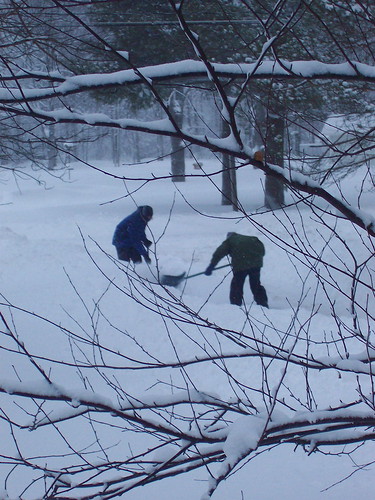
On winter mornings, my husband gets up the earliest. He turns up the heat, puts the kettle on the stove for cocoa and tea, and begins making lunches for the kids to take to school. The first thing I do when I finally get out from under our down quilt is look out the window to see how much snow has fallen during the night. I love the way the landscape looks covered with a new layer of fresh white, glowing in the blue light of early morning. The wind blows the snow into graceful drifts, clean and untouched.
Of course, it doesn't stay like that. If more than six inches have fallen, we have to shovel the driveway, our boots plunging into those curving arcs of snow. The wind rattles the chimes that hang from the front porch and blows a mist of white snow across the banks that line the driveway. It's a nice way to wake up, really – to be outside in the muffled winter world, getting the blood circulating with a bit of exercise, breathing in the cold winter air that is filled with oxygen and moisture. Shaggy Hair Boy was in especially good spirits this morning as he and Boy in Black tossed snow up over their shoulders and onto the high banks: thanks to the weather, he and With-a-Why had another day off from school.
February 15, 2007
Snow Day
We've had lots of snow this week. I don't know how much exactly, but we are measuring it in feet, and not inches. When I walked in the front yard yesterday morning to rescue a snow shovel this morning, it was well past my knees, and at least another foot fell after that. As soon as I looked out the window yesterday morning, I knew that my kids didn't have school. I emailed my students to let them know we wouldn't have class, but my husband felt he needed to go to work, even though he had been making calls all morning to his staff, telling them to stay home. No matter how much snow we get, he has this idea that if he gets going fast enough, he can get his car out of the driveway. This method often works, but yesterday, he ended up stuck in a snowdrift.
At least one person in the family thinks that the icy ruts underneath several feet of snow, caused by a poor shoveling job during the last snowstorm, contributed his inability to stay in the driveway. I might add that the reason the driveway shoveling has been executed so poorly this winter is because the most conscientious worker, the one person in the family who likes shoveling snow, has been down with a knee injury. I pointed this out only half a dozen times before family members threatened to hurt my remaining good knee.
A neighbor with a four-wheel drive truck stopped with an offer to pull my husband's car out, but then somehow his truck ended up in the ditch as well. That is the thing about these ridiculous storms that dump several feet of powdery snow on top of icy pavements; suddenly, everything goes crazy, like some kind of Saturday Night Live skit.
By the time Shaggy Hair and I trudged out to the end of the driveway, the neighbor from across the way had joined the scene as well, everyone in surprisingly good spirits as they offered suggestions about how to get the car out. It's kind of a seasonal pastime, here in Snowstorm region, the challenge of getting those vehicles out of snowbanks and ditches. It becomes a physics problem really: everyone stand on the bumper to get this tire in a different position, okay, now turn the wheel that way, now get the car rocking ....
After about two hours of ridiculous maneuvers that included logs from the woodpile inserted under various tires and human bodies balanced precariously on the back bumper, we got the car out, and my husband left for work. About lunch time, while With-a-Why and I were eating soup at the kitchen table, I phoned Boy in Black to see how he was doing at Snowstorm University. I had just heard that the afternoon classes were cancelled because of the weather. He sounded pretty upbeat. "Hey, are Shaggy Hair and With-a-Why having a snow day? I'm thinking of coming home to spend time with them."
"The roads are terrible," I told him. "Don't try to drive home."
With-a-Why, listening to my phone call as he ate his soup, looked up sadly. "But it's no fun to have a snow day without Boy in Black."
I felt bad. I know how close to Boy in Black my youngest son is. I was about to explain to him the dangers of driving on winter roads, when I heard a knocking at the front door.
It was Boy in Black, who came in with a big grin, shaking the snow out of his long hair and stamping his boots as he walked in. "Hey, the roads aren't so bad."
"Where were you when we were talking on the phone?"
"Just at the corner. I knew you'd worry if I told you I was driving home."
He shook the snow off his clothes, tossed his coat onto a hook, and settled down on the couch in front of the fire. With-a-Why gave me that kind of smile that says, "Isn't my big brother cool?" and went over without a word to snuggle next to him.
I admit, I was glad he had come. He spent the afternoon playing with With-a-Why and helping Shaggy Hair with his chemistry homework. When we went out to shovel the new foot of snow that had fallen, it was great to have his help. Our driveway is long, but Boy in Black, eighteen and in top physical shape, shovels snow the way a cartoon character might. It was done in no time at all.
Later that night, after my husband had made it safely home, the boys decided to go out and play frisbee in the dark. They've got this special frisbee that lights up. Playing outside is wonderful on a night when we've got a few feet of fresh powder. You can backflip off the porch and not get hurt at all. "It's mad fun to try to run through snow up to your waist," said Boy in Black.
As I helped Shaggy Boy put the cuffs of his gloves inside the sleeves of his coat, he looked up at me and said, "You know, I probably should be studying Chemistry or French. I've got two tests tomorrow."
He pulled his hat down over his eyes, covering his curly hair. "But playing frisbee with my brothers is more important."
I think he's right.
At least one person in the family thinks that the icy ruts underneath several feet of snow, caused by a poor shoveling job during the last snowstorm, contributed his inability to stay in the driveway. I might add that the reason the driveway shoveling has been executed so poorly this winter is because the most conscientious worker, the one person in the family who likes shoveling snow, has been down with a knee injury. I pointed this out only half a dozen times before family members threatened to hurt my remaining good knee.
A neighbor with a four-wheel drive truck stopped with an offer to pull my husband's car out, but then somehow his truck ended up in the ditch as well. That is the thing about these ridiculous storms that dump several feet of powdery snow on top of icy pavements; suddenly, everything goes crazy, like some kind of Saturday Night Live skit.
By the time Shaggy Hair and I trudged out to the end of the driveway, the neighbor from across the way had joined the scene as well, everyone in surprisingly good spirits as they offered suggestions about how to get the car out. It's kind of a seasonal pastime, here in Snowstorm region, the challenge of getting those vehicles out of snowbanks and ditches. It becomes a physics problem really: everyone stand on the bumper to get this tire in a different position, okay, now turn the wheel that way, now get the car rocking ....
After about two hours of ridiculous maneuvers that included logs from the woodpile inserted under various tires and human bodies balanced precariously on the back bumper, we got the car out, and my husband left for work. About lunch time, while With-a-Why and I were eating soup at the kitchen table, I phoned Boy in Black to see how he was doing at Snowstorm University. I had just heard that the afternoon classes were cancelled because of the weather. He sounded pretty upbeat. "Hey, are Shaggy Hair and With-a-Why having a snow day? I'm thinking of coming home to spend time with them."
"The roads are terrible," I told him. "Don't try to drive home."
With-a-Why, listening to my phone call as he ate his soup, looked up sadly. "But it's no fun to have a snow day without Boy in Black."
I felt bad. I know how close to Boy in Black my youngest son is. I was about to explain to him the dangers of driving on winter roads, when I heard a knocking at the front door.
It was Boy in Black, who came in with a big grin, shaking the snow out of his long hair and stamping his boots as he walked in. "Hey, the roads aren't so bad."
"Where were you when we were talking on the phone?"
"Just at the corner. I knew you'd worry if I told you I was driving home."
He shook the snow off his clothes, tossed his coat onto a hook, and settled down on the couch in front of the fire. With-a-Why gave me that kind of smile that says, "Isn't my big brother cool?" and went over without a word to snuggle next to him.
I admit, I was glad he had come. He spent the afternoon playing with With-a-Why and helping Shaggy Hair with his chemistry homework. When we went out to shovel the new foot of snow that had fallen, it was great to have his help. Our driveway is long, but Boy in Black, eighteen and in top physical shape, shovels snow the way a cartoon character might. It was done in no time at all.
Later that night, after my husband had made it safely home, the boys decided to go out and play frisbee in the dark. They've got this special frisbee that lights up. Playing outside is wonderful on a night when we've got a few feet of fresh powder. You can backflip off the porch and not get hurt at all. "It's mad fun to try to run through snow up to your waist," said Boy in Black.
As I helped Shaggy Boy put the cuffs of his gloves inside the sleeves of his coat, he looked up at me and said, "You know, I probably should be studying Chemistry or French. I've got two tests tomorrow."
He pulled his hat down over his eyes, covering his curly hair. "But playing frisbee with my brothers is more important."
I think he's right.
February 14, 2007
From guesthouse to barnyard
Although my monastery journal makes it sound often like I spend all my time alone when I'm on retreat, that isn't really quite true. When you gather six women together at a monastery guesthouse, all kinds of deep and interesting conversations take place. I'd traveled to the monastery with two friends, one of whom I've known for years, but I was pleased and surprised to find that the other two weekend guests were women I'd met before: a former student and her mother. I had had many wonderful conversations in the classroom with Long Gorgeous Hair when she was my student so I knew it would be great to have her in the circle of women gathering in front of the fire in the evening to talk.
The conversations during the weekend jumped from topic to topic: marriage, parenting, sex, politics, the church, the media, the way women in our culture view their bodies. It's amazing how quickly the discussions became intimate as we shared our stories, our opinions, our philosophical thoughts. Even when we talked about movies we'd seen, the conversation went into depth. How cosy it was to sit on the comfy chairs in the living room of the guesthouse with glasses of juice or wine while winter winds blew snow up against the dark windows and flames crackled against the logs in the fireplace.
On Sunday morning, I had time to visit with Brother Beekeeper, a monk has been at the monastery for my entire life. (He entered in the fall of 1960.) We joked as usual, me teasing him that my role at the monastery is to educate the monks about feminism, and we talked about what is going on with the farm: his efforts to make sure the cider they sell isn't contaminated, his plans for the baby sheep that will be born in April.
And of course, part of my visit to the monastery always includes visiting the other creatures who live there: the cats, the birds, the donkeys, the sheep. I wandered into the barns to smell the huge stacks of hay stored under the old wooden roofs. When I came into the barnyard, the sheep that were gathered near the doorway ventured out to look at me curiously. I got the idea that they too find February a long month.
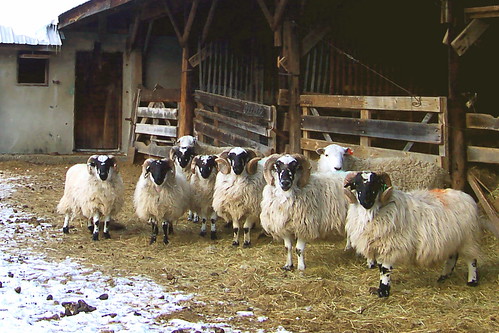
The conversations during the weekend jumped from topic to topic: marriage, parenting, sex, politics, the church, the media, the way women in our culture view their bodies. It's amazing how quickly the discussions became intimate as we shared our stories, our opinions, our philosophical thoughts. Even when we talked about movies we'd seen, the conversation went into depth. How cosy it was to sit on the comfy chairs in the living room of the guesthouse with glasses of juice or wine while winter winds blew snow up against the dark windows and flames crackled against the logs in the fireplace.
On Sunday morning, I had time to visit with Brother Beekeeper, a monk has been at the monastery for my entire life. (He entered in the fall of 1960.) We joked as usual, me teasing him that my role at the monastery is to educate the monks about feminism, and we talked about what is going on with the farm: his efforts to make sure the cider they sell isn't contaminated, his plans for the baby sheep that will be born in April.
And of course, part of my visit to the monastery always includes visiting the other creatures who live there: the cats, the birds, the donkeys, the sheep. I wandered into the barns to smell the huge stacks of hay stored under the old wooden roofs. When I came into the barnyard, the sheep that were gathered near the doorway ventured out to look at me curiously. I got the idea that they too find February a long month.

February 13, 2007
Cold winter air

On retreat, I always make time for walks by myself. Because the monastery is located outside the snowbelt, the roads and paths were clear last weekend, without the big snowbanks that the roads in Snowstorm Region have, dry pavement just right for someone with a knee injury. Saturday was icy cold, so I dressed warm. The guesthouse is on the highest hill, and snow-covered fields stretched in all directions.
The grounds of the monastery were quiet on a February morning. Guests were tucked safely into guesthouses, and the little parking lot for townspeople was empty. Even the sheep were huddled inside the big barn. During my walk, I passed only one other person, a monk. He was striding along purposefully, swinging his arms, his head bent into the wind. No matter what time of year I come to the monastery, I always see Brother SwingsArms. He walks religiously, no matter what the weather. He looked over at me and smiled, but said nothing, and continued on his way.
I love the clarity that cold weather brings. Suddenly, I could see far. Tree branches, stark without their leaves, held up the icy blue sky. My own breath shuddered warm against my fleece neck wrap as I trudged along, and when I went off the road to walk through the little cemetery, my feet crunched through the crust of snow. I wandered around, gulping in the cold air and glorying in the views I could see with all the foliage gone. In the sheep meadows, dried grasses curved in big golden arcs against the white snow.
When my fingers and toes began to hurt, I made my way down to the chapel. As soon as I stepped inside the heavy wooden doors, the musky air rushed at me, smelling of wax and incense, surrounding me with warmth. The chapel was empty, completely deserted, and I was alone as I made my way down the stone stairs into the crypt below, a dark area lit only by dozens of votive candles shimmering at the base of a fourteenth century stone statue of a woman.
Earlier, when I was getting dressed, I realized that I'd forgotten to bring a hat. Leaving home, I had grabbed my bag of snowboarding clothes, but I don't wear a hat when I snowboard because I wear a helmet. So instead of a hat, I had wrapped a fleece scarf around my long hair and put up my hood. When I pulled down my hood in the dark crypt, and yanked away the scarf, sparks came snapping from my hair, brilliant flashes of light. I sat down in my usual spot on the stone floor, warming my hands on some of the votive candles and feeling strangely powerful.
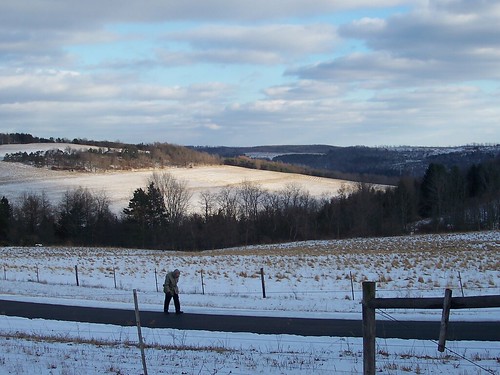
Brother SwingsArms taking his morning walk.
February 12, 2007
Monastery in winter
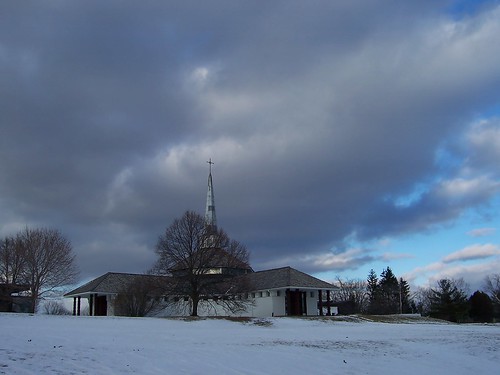
Storm clouds hung over Snowstorm City on Friday, with wind and snow swirling into a fog of whiteness that made seeing almost impossible. But warm inside a small car, sharing popcorn and stories, my two friends and I drove away from the center of the storm, travelling southwest towards the monastery, hoping to leave behind the gusts of snow.
After about an hour, we could see dry pavement. We were travelling though hills of farm country, the fields all glittering with white and gold. By the time we reached the monastery, the afternoon sun was at that angle that makes the sky blue. Big storm clouds kept rolling over the hills and even the steeple of the chapel, but no snow was falling. Deer had emerged to graze on the lawn of the old farmhouse that serves as the women's guesthouse, and the woman who takes care of the guesthouse greeted us at the door with hugs and warm words in her lovely British accent.
Usually when I come to the monastery, my friends and I stay in one of the three separate little guesthouses down near the chapel, but on this trip we were staying in the women's guesthouse, which is perched up on the highest hill. I chose the bedroom tucked behind the old stone fireplace. Most of the guest bedrooms are upstairs, but the Cinderella room is off by itself in the back of the house, with a little window that looks out over the woods. It's small, with just enough room for a single bed, a chair, and a small oak table. I had it all to myself. I love the luxury of my own room. I shoved my duffle bag under the bed, sat down at the little table with my journal, looked out the window at the woods, and felt perfectly content.
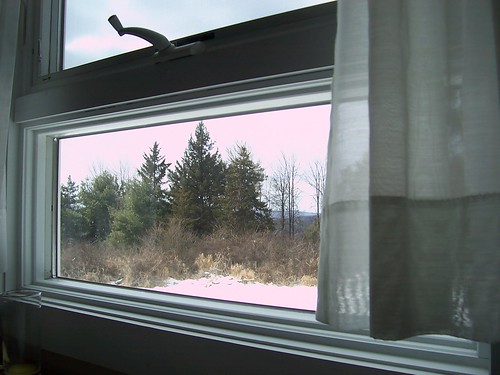
February 09, 2007
Healing
My injured knee is healing slowly, far too slowly for someone as impatient as I am. By the middle of this week, I came to the realization that despite all the wonderful snow we've gotten this week, I am not going to be able to snowboard this weekend. Even though I am tempted, it just doesn't make sense to go back to the slopes until the ligament and cartilage are fully healed. To be honest, it's not so much that I fear the physical pain, it's that if something happened to make the injury worse, I just couldn't stand to hear all the people in my life saying, "I told you so."
February here in Snowstorm Region is a long month of snow and ice, weather so fierce that it often makes the front page of the newspaper. It's a month of introspection and melancholy moods. I decided that if I couldn't combat the February blues with fresh winter air and the adrenaline of carving down a mountain slope, I would try the next best remedy: a retreat.
So I am off for a few days to one of my favorite places: a Benedictine monastery. It's a cluster of buildings – a chapel, some guesthouses, and the barns of a working sheep farm – set high in the hills. The winter wind rushing across the hills will be fierce, I imagine, and the sheep pastures buried in drifts of snow, but I'll be warm inside by the fire in the guest house, or at my spot in the chapel that smells of incense and candle wax. I'll have to time to read, to pray, to think, to heal.
February here in Snowstorm Region is a long month of snow and ice, weather so fierce that it often makes the front page of the newspaper. It's a month of introspection and melancholy moods. I decided that if I couldn't combat the February blues with fresh winter air and the adrenaline of carving down a mountain slope, I would try the next best remedy: a retreat.
So I am off for a few days to one of my favorite places: a Benedictine monastery. It's a cluster of buildings – a chapel, some guesthouses, and the barns of a working sheep farm – set high in the hills. The winter wind rushing across the hills will be fierce, I imagine, and the sheep pastures buried in drifts of snow, but I'll be warm inside by the fire in the guest house, or at my spot in the chapel that smells of incense and candle wax. I'll have to time to read, to pray, to think, to heal.
February 08, 2007
The bleak landscape of February
On days of high wind and swirling snow, the world here is strangely monochrome. White envelopes the yards, the fields, the roadways. Even the sky becomes the lightest grey colour, and whole houses, whole towns, disappear behind the blur of falling snow. It is possible in this weather to feel utterly alone.
Driving home, I figure out where the road is by familiar landmarks – mailboxes, pine trees, big red barns. The ditches are filled with snow, ready to capture the tire of a car that follows the wrong path or slides on a patch of ice. I can see why red is the traditional colour to paint barns in this part of the country: it's the only colour that sounds out in a white and grey world. Everything else, the bare branches of trees, the mailboxes, the telephone poles, becomes a stark silhouette.
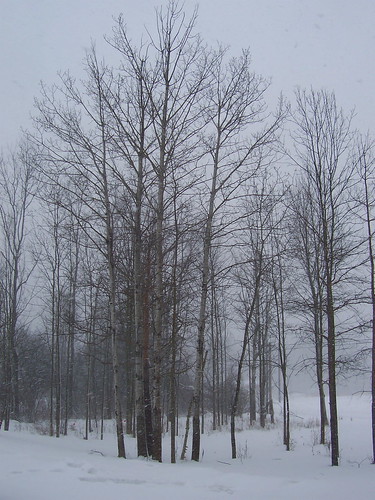
My front yard, this morning.
Driving home, I figure out where the road is by familiar landmarks – mailboxes, pine trees, big red barns. The ditches are filled with snow, ready to capture the tire of a car that follows the wrong path or slides on a patch of ice. I can see why red is the traditional colour to paint barns in this part of the country: it's the only colour that sounds out in a white and grey world. Everything else, the bare branches of trees, the mailboxes, the telephone poles, becomes a stark silhouette.

My front yard, this morning.
February 07, 2007
Ceiling fans can be fun
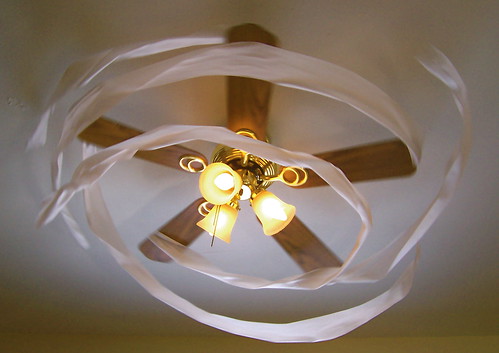
My kids and their friends have always been good at inventing games and making their own fun. One time on a hot summer night, for instance, I came home to find that the kids had built a swimming pool. They'd taken long logs that hadn't yet been cut into fireplace-sized pieces, piled the logs crisscross like you would to make a log cabin, and then covered that with any plastic they could find, including all of our shower curtains. Because they wanted a luxurious heated pool, they duct taped the garden hose to the kitchen faucet and turned on the hot water. The pool was pretty shallow, maybe a foot deep altogether, but Blonde Niece, Shaggy Hair Boy, and With-a-Why, who were pretty small then, had fun splashing around until the mosquitoes drove them inside.
Indoor sledding was another game the kids played when they were little. They would take all the blankets and pillows in the house and pile them on the staircase until it was a steep, slippery hill of bedding. Then they would ride down on a plastic toboggan, screaming in delight. As the kids got older, the games got more elaborate. My daughter and her friends used to turn the kitchen linoleum into a skating rink by rubbing the floor with margerine and the sliding across in their bare feet. Boy in Black and his friends went through a winter of fire experiments in the backyard that involved all kinds of flammable items. I figure it's safe to let them play with fire so long as we have at least a foot of snow on the roof.
Play is vital to learning, so I usually don't veto anything unless it looks like someone might get hurt. Playing teaches us science, math, and how the physical world works. Play is important for problem-solving, for analytical thinking, and for creativity. Besides, I think the kind of science experiments my kids come up with are cool. It's fun to duct tape things to a ceiling fan and then turn it on to see what happens. Toilet paper – which is lightweight and readily available – creates a lovely effect when it's taped to ceiling fan.
February 06, 2007
Somewhere I've Never Travelled

When I was first married, my husband and I lived in an apartment right next to the traintrack that runs through Traintrack Village. When locomotives went by, the dishes in the cupboard rattled and the rush of clacking wheels filled the room. Even in my sleep, I'd hear the trains rumbling past.
I live now on a road that deadends into that same railroad track. We're a bit farther away, so I no longer feel like the trains might come crashing right through the living room. But still, sometimes I'll feel this vibration, this energy, moving through the house, followed by faint clangs and whistles. As the trains rush past, carrying all kinds of stuff, sometimes with passengers, I think about my connections to other parts of the country, and even to the rest of the world. I think about my friends scattered in distant places, and the places I've been.
More often than not, my daydreams lead me to think of those places I haven't been to yet, the areas still left to explore. When I was a kid, I loved playing with traintracks, setting them up and pushing the little trains over them, making pretend villages and cities, building complicated bridges that needed stacks of books to hold them up, extending the tracks as far as they could possibly go. The sound of a train moving along a track I've lived near my whole life still makes me think of all those possibilities, the idea of going somewhere I've never travelled.
February 05, 2007
Teaching Audre Lorde to forestry students
Even though I teach literature courses, my students aren't English majors. Many of them are studying to be scientists, some forest rangers. Although I always have a handful of students that come from the Big City Like No Other, most of my students come from small towns in the middle of nowhere. Quite a few have worked on family farms or construction crews.
Last week, when I assigned a bunch of Audre Lorde poems, I warned my students that the poems would be difficult. "But tackle them anyhow," I said, "Read them aloud to your friends, write about them, see if you can find one that touches you." I warned them that poetry is different than science; they might need to use a different part of their brain.
In class on Friday, I was pleased at how enthusiastically they discussed the poems. "You know, I don't completely understand this poem," one woman said, "But I like it."
FromQueens chose a poem that was set in Big City Like No Other, and she kept saying, "Wow, this poem's depressing."
FlannelShirt, a shy, big man who is more likely to carry a chain saw than a metro card, spoke up, "But I liked how she kept talking about flames, you know, fire and ashes." He looked at his classmate, "That seemed kinda hopeful."
I looked at him to encourage him to say more. "The phoenix imagery, you mean?" I waited for him to talk about the mythical bird that bursts into flame and then rises again from the ashes.
He gave me a puzzled look and shifted in his seat. "Forests, I mean. Old growth forests. That's how they regenerate. From fire. They burn, and that starts new growth."
Exactly.
Last week, when I assigned a bunch of Audre Lorde poems, I warned my students that the poems would be difficult. "But tackle them anyhow," I said, "Read them aloud to your friends, write about them, see if you can find one that touches you." I warned them that poetry is different than science; they might need to use a different part of their brain.
In class on Friday, I was pleased at how enthusiastically they discussed the poems. "You know, I don't completely understand this poem," one woman said, "But I like it."
FromQueens chose a poem that was set in Big City Like No Other, and she kept saying, "Wow, this poem's depressing."
FlannelShirt, a shy, big man who is more likely to carry a chain saw than a metro card, spoke up, "But I liked how she kept talking about flames, you know, fire and ashes." He looked at his classmate, "That seemed kinda hopeful."
I looked at him to encourage him to say more. "The phoenix imagery, you mean?" I waited for him to talk about the mythical bird that bursts into flame and then rises again from the ashes.
He gave me a puzzled look and shifted in his seat. "Forests, I mean. Old growth forests. That's how they regenerate. From fire. They burn, and that starts new growth."
Exactly.
February 03, 2007
Hot water and sunshine

Throughout the month of February, my feet are cold. Not just my feet, but my neck, my hands, and my forehead. Cold seeps from the icicles that hang from roofs, from the snow drifted against fences and bushes, from the salty slush that splatters along the roadways; winter chill creeps into my bones. Usually, I combat this chill with aerobic exercise. Snowshoeing or cross-country skiing can force blood to pump warmth all the way to my toes. But today, with a knee injury keeping me still, I decided to try the one remedy that doesn't involve legwork: a hot bath.
On a Saturday morning, with the teenagers asleep and my husband off at an annual meeting, I had the sunny bathroom all to myself. Just locking the door gave me that feeling of peace: I was alone. Steam rose from the water as the tub filled, water as hot as I could get.
How luxurious to soak in hot water, the sun catching the shower curtain that I'd pushed to the side, sun brushing my arms with warmth when I reached over the side of the tub to pick up my book. When the water cooled just a little, I turned on the faucet to add more hot water, the heat splashing onto my feet until my toes turned red. Even when I was a little kid, I always loved a hot bath, loved to run my soapy hands along my slippery skin, admire my legs as I twisted and turned them in the clear water. I don't use bubble bath because I am allergic to it, so the water stays as clear as rain gathered in the smooth indentation of island rock.
The scent of lavender filled the room as I sudsed my hair, piling foamy wet strands on top of my head. I've got lots of hair, long and thick and wavy, so it feels different to have it all mashed together. The sun from the window touched the back of my neck, sending warm tingles down my spine. I played with my soapy hair, pulling it into all kinds of silly sculptured hairstyles: hair filled with shampoo is more fun than modeling clay. Wet tendrils dropped to tickle my throat.
The house was quiet. No sound came from behind the white painted door, no noise from the blue and white world outside the window. In the steamy heat, I could close my eyes against the flood of sun and imagine that I was lying on the grey rock of a river island, basking in the heat of summer.
February 02, 2007
Over troubled water
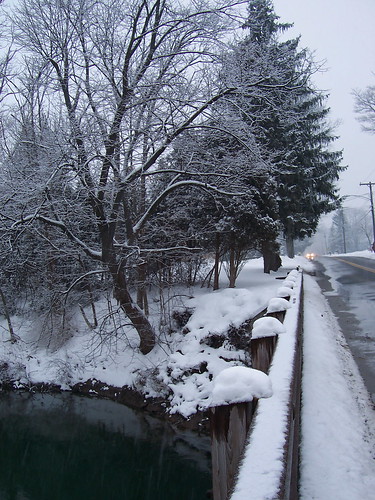
My knee injury is healing, but I still can't risk hiking on uneven ground, through drifts of snow and patches of ice. In other words, I can't go for a walk in my own woods. But being inside all the time is driving me crazy. So on this snowy winter afternoon, I put on my boots and trudged out to the level, plowed road that runs past my house.
The road travels through the wooded area where I live and then turns towards Traintrack Village, crossing a creek just before it gets to the village. The village is quiet on a Friday afternoon, especially with mounds of fluffy snow snuggled up against houses and mailboxes. Snow fell steadily as I walked, flakes melting on my eyelashes and clinging to my hair.
On a windless day, the trees gather snow the way children might gather candy after a pinata has exploded. Every pocket of pine was filled with white. Even the bare branches of elms and maples held lines of snow, white against the grey sky. The dark green creek moved lazily underneath the bridge, moving past icy logs and steep white banks.
Lights began flickering on inside homes, each window showing a different scene: children playing some kind of game, a woman reading the newspaper, a teenager carrying logs for a fireplace. As I turned to walk back towards my own house and fireplace, a car drove past through the slush, someone hurrying home from work on a Friday afternoon.
February 01, 2007
Roots
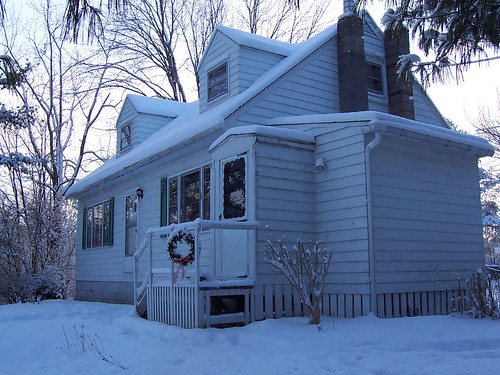
Here is the house where I lived from birth until my marriage. My father, whose own father was a master carpenter, built the house. When I say built, I mean that literally. He poured the concrete, hammered the nails, put in the wiring, painted the walls. He and his father had built many houses together, but his father died before this house was finished. It was the last one they worked on together.
I like Cape Cod houses: the slanted ceilings in the upstairs bedrooms seem cosy, and the gables make wonderful little nooks. My father was always changing things around inside the house to accommodate a growing family: he would take a Saturday afternoon to rip out a wall, or put in a bookshelf, or build a new closet. Often I'd come down the stairs to see the familiar grey sawhorses in the living room, and we were always vacuuming up sawdust from the carpeting. Now that the kids are all grown up, he's removed some of the walls in the downstairs, so that the grandchildren can run around the center staircase. This is the house where we gather for holiday meals, the place where my out-of-town siblings stay when they come to town.
Those front steps are famous for a funny incident that occurred when I was about ten. Well, it's funny only because I didn't get hurt. My mother had moved the steps into the basement to paint them; apparently everyone in the house had been warned but somehow I didn't hear the warning. Well, that's not unusual, even then I was often reading or daydreaming or, as my kids would say, "in a daze." That morning after I gathered up my school things, my mother handed me my lunch, told me to have a nice day at school, and then watched me walk right out the door. She said she can remember my pigtails dramatically flying in the air as I fell to the ground.
On the side of the house, which has no windows because it faces the prevailing wind, which is cold in the winter, the lilac bushes used to grow tall. My brother and I spent many sunny hours playing with our trucks under those bushes, using our truckdriver nicknames, Jo and Joe. The big picture windows in the front of the house are the ones we used to paint sometimes for Christmas. Blonde-haired Sister was especially good at brushing colorful designs on the glass. Often, too, my mother would set up a cardtable in front of one of those windows, and we'd work on a jigsaw puzzle. I can remember those lazy winter afternoons, watching the snow fall onto the blue-tinted snowbanks outside while we worked on the puzzle inside the warm house, my mother pulling a lamp over as it grew dark. On winter afternoons, our house smelled of baking cookies or homemade bread, spaghetti sauce or meat loaf or pot roast.
The far gable window upstairs is the bedroom I shared in the early years with my sisters and my brother. A chest of drawers stood in front of that window, and we'd climb up to stare out the window, and then jump dramatically down onto one of the beds. We always got yelled at for jumping on the beds but we did it anyhow. The closer gable window is the room I shared later with my baby sister, after she was born. I remember how excited I was when my mother told me I would get to share a room with the baby. It's hard to believe that that baby is in her mid-thirties now, living off in the big city.
My parents celebrated their wedding anniversary today, 49 years together, and 48 of those years have been spent in this house, just a few miles away from where I live now. We had a quiet lunch together at a local restaurant, and tonight they are probably lighting a fire in the woodburning stove, and settling into their comfy chairs to read. There are no streetlights where they live, and at night the sky fills with stars.
Photo credit: my father took this photo yesterday.
Subscribe to:
Comments (Atom)

